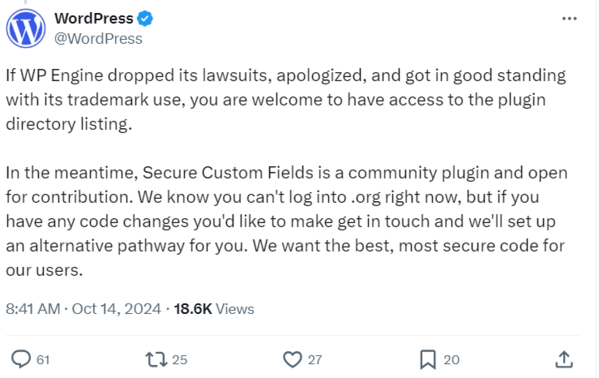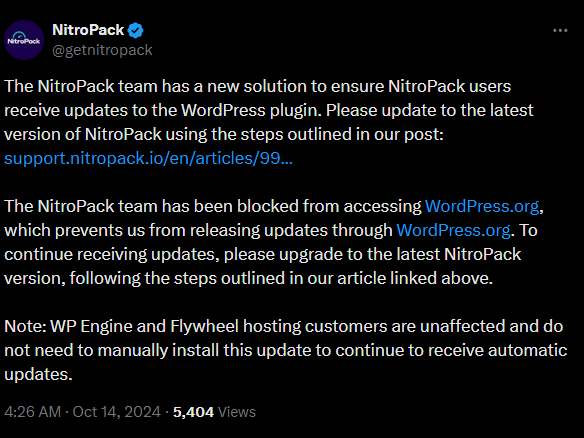Maybe I'm supposed to get mad at this, but instead I just get sad. Mullenweg clearly sees it as a failure to create much more value in the world than what you capture, and maybe that's the root of our differences. I see that as a proud achievement. https://t.co/SBDgBE5X10
— DHH (@dhh) October 14, 2024
In a dramatic twist to the ongoing feud between WordPress and WP Engine, WordPress CEO Matt Mullenweg recently deleted a highly controversial blog post that took direct aim at David Heinemeier Hansson, the creator of Ruby on Rails. The post, which was recovered through Time Travel now that Wayback Machine is still recovering from a massive data breach, was more than just a defense of WordPress’ actions — it was a personal attack on David, questioning his business acumen and even his ability to scale his products.
Mullenweg’s sharp critique didn’t sit well with many in the developer community. What started as a legal battle over trademarks between WordPress and WP Engine has now spilled over into a public war of words, with Mullenweg’s deleted post standing as a prime example of how personal this conflict has become.
The post that sparked a firestorm
David Heinemeier Hansson, a vocal advocate for open-source principles and founder of the popular Ruby on Rails framework, had criticized WordPress in a blog post, referring to Matt as the “mad king” from the popular TV show, Game of Thrones. In it, he expressed concerns about WordPress’ handling of its dispute with WP Engine, particularly over the controversial takeover of WP Engine’s Advanced Custom Fields (ACF) plugin. David warned that Automattic, WordPress’ parent company, was setting a dangerous precedent by using its control over plugin registries to penalize competitors and settle corporate disputes.
David’s post quickly gained traction, drawing attention to what many in the open-source community saw as a serious violation of trust. But Mullenweg didn’t take kindly to David’s critique.
In his now-deleted blog post that I managed to recover through Time Travel, Mullenweg launched a scathing personal attack, accusing David of inserting himself into a legal dispute unnecessarily and questioning his credibility as a businessman. Mullenweg mocked David’s ventures at 37signals, such as Basecamp, Campfire, and Hey, suggesting that he struggled to scale his products successfully compared to WordPress due to his “toxic personality.”
“DHH claims to be an expert on open source,” Mullenweg wrote. “But his toxic personality and inability to scale teams means that although he has invented about half a trillion dollars worth of good ideas, most of the value has been captured by others,” implying that David was bitter because his businesses hadn’t achieved the same global reach as Automattic. In what many viewed as an unnecessary low blow, Mullenweg suggested that Hansson might need therapy for his inability to grow his companies as successfully as WordPress.
David, perhaps it would be good to explore with a therapist or coach why you keep having these great ideas but cannot scale them beyond a handful of niche customers. I will give full credit and respect. 37signals inspired tons of what Automattic does! We’re now half a billion in revenue. Why are you still so small?
WordPress CEO’s personal attack on David was met with swift backlash from the developer community. Many saw the post as unprofessional and unbecoming of a CEO leading one of the largest open-source platforms in the world. Within hours, the post was taken down, but not before it was archived and shared widely online.
The decision to delete the post hasn’t silenced the criticism. In fact, it has only added fuel to the fire, with many now questioning whether the WordPress founder is using his platform’s dominance to bully critics into submission. The deletion itself has become symbolic of the larger issues at play — issues of power, control, and governance in the open-source ecosystem.

Mullenweg’s deleted post wasn’t just a personal jab at David; it reflected a broader clash of ideals within the open-source world. The tension between these two has left the developer community divided. Some see Mullenweg’s actions as necessary steps to safeguard WordPress from what he sees as unfair competition. Others like David, however, fear that WordPress is using its power as a platform owner to stifle innovation and punish competitors, undermining the very openness that has made WordPress so successful.
The public spat between Mullenweg and David has added a new layer of complexity to the already heated battle between WordPress and WP Engine. In addition to the ACF plugin controversy, WordPress also blocked NitroPack, a third-party optimization plugin, from its plugin directory. This has raised fears that Automattic is using its control over the WordPress ecosystem to push out competitors and consolidate power. Developers are now questioning whether WordPress, once the darling of the open-source world, is shifting toward a more corporate, monopolistic model.
While some have dismissed the controversy as irrelevant to their day-to-day work, developers working with larger clients or white-label agencies are feeling the impact directly. One Redditor shared how their client, aware of the WordPress-WP Engine conflict, backed out of a contract and reconsidered using WordPress altogether. This domino effect could have severe long-term consequences for both WP Engine and WordPress developers.

Meanwhile, WP Engine continues to fight back in court, defending itself against trademark violation claims while trying to reassure its customers and developers that it remains committed to the open-source principles that underpin WordPress.
While Mullenweg may have deleted his controversial post, the issues it raised aren’t going away anytime soon. The WordPress vs. WP Engine battle, coupled with the public spat between Mullenweg and David, has highlighted deep-seated concerns about the future of open-source governance.
Featured image: Souvik Banerjee / Unsplash
TechIssuesToday primarily focuses on publishing 'breaking' or 'exclusive' tech news. This means, we are usually the first news website on the whole Internet to highlight the topics we cover daily. So far, our stories have been picked up by many mainstream technology publications like The Verge, Macrumors, Forbes, etc. To know more, head here.


